New Survey: 40% of Unemployed Have "Given Up"
May 20, 2015
New Survey: 40% of Unemployed Have "Given Up"
Express Releases 2015 "State of the Unemployed" Survey
Long-Term Jobless Are Being Left Behind
Nearly Half Hold Themselves Responsible For Not Finding A Job
_____________________
OKLAHOMA CITY, May 20, 2015 - Express Employment Professionals released the results today of its second annual in-depth poll, "The State of the Unemployed," revealing that 40 percent of unemployed Americans agree to some extent that they have completely given up looking for work.
That figure, though high, represents a slight improvement from 2014, when 47 percent said they had given up.
The survey of 1,553 jobless Americans age 18 and older was conducted online by Harris Poll on behalf of Express Employment Professionals between April 7 and 29, 2015, and offers a rare look at the background and attitudes of the unemployed, their approach to the job hunt, who they blame for their current situation, and how they are holding up through tough times.
"We often hear people theorizing about what motivates the unemployed or how joblessness is affecting the lives of our fellow Americans. Instead of guessing, we decided to ask them," said Bob Funk, CEO of Express Employment Professionals and a former chairman of the Federal Reserve Bank of Kansas City.
"This survey shows that some of the troubling trends we observed last year are continuing. While the economy is indeed getting better for some, for others who have been unemployed long-term, they are increasingly being left behind."
WHO ARE THE UNEMPLOYED?
According to the survey, 57 percent of the unemployed are men; 43 percent are women.
The largest groups by age are those between 18-29 and 50 or older:
- 35 percent are ages 18 to 29.
- 21 percent are 30 to 39.
- 17 percent are 40 to 49.
- 18 percent 50 to 59.
- An additional nine percent are 60 or older.
The vast majority lack a college degree:
- 2 percent did not attend high school.
- 8 percent received some high school education.
- 37 percent received only a high school diploma.
- 5 percent reported they received job-specific training after graduating high school.
- 20 percent attended college, but did not receive a degree.
- 8 percent hold an associate's degree.
- 14 percent hold a bachelor's degree.
- 1 percent have some graduate school experience, but no degree.
- 4 percent have a graduate degree.
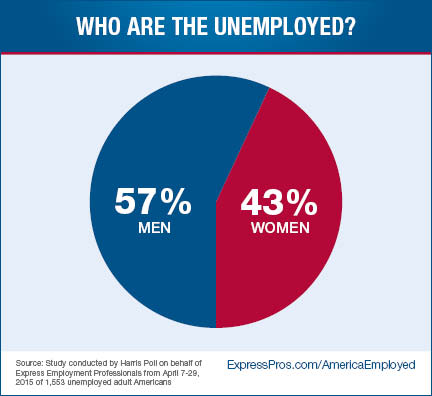
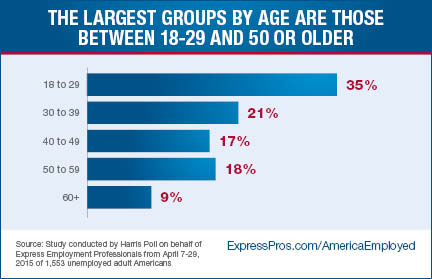
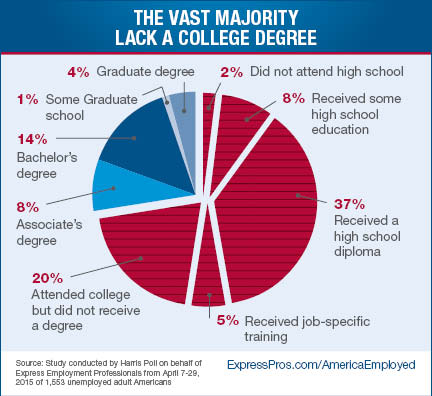
UNEMPLOYMENT IS A CHRONIC CONDITION
Compared to last year, the average duration of unemployment has increased by greater than three months, from 23.2 months to 26.8 months:
- 23 percent have been out of work for three months or less.
- 15 percent have been out of work for four to six months.
- 12 percent have been out of work for seven to 12 months.
- 5 percent have been out of work for 13 to 18 months.
- 5 percent have been out of work for 19 to 24 months.
- 41 percent have been out of work for more than 24 months.
The most notable figure is clear: More than two out of five unemployed Americans have been jobless for more than two years. That represents an increase from 2014, when 32 percent said they had been out of work for more than two years.
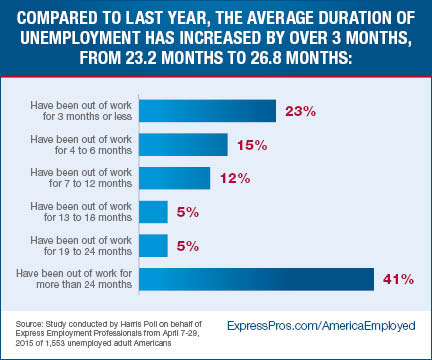
MANY ARE GIVING UP, ESPECIALLY THE LONG-TERM UNEMPLOYED
The job market is discouraging for many. A full 40 percent say they "agree" with the statement, "I've completely given up on looking for a job."
To break that down,
- 7 percent of the unemployed say they "agree completely."
- 6 percent say they "agree a lot."
- 11 percent "agree somewhat.
- 16 percent "agree a little."
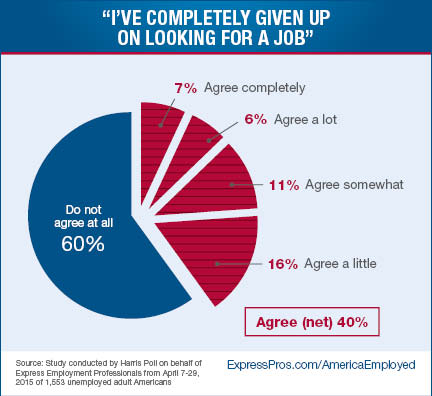
Time takes a toll. The longer someone is out of work, the more likely that person will report having given up.
- 21 percent of those out of work three months or less agree they have given up.
- 37 percent of those out of work four to six months agree they have given up.
- 34 percent of those out of work seven to 12 months agree they have given up.
- 32 percent of those out of work 13 to 24 months agree they have given up.
- 55 percent, a clear majority, of those out of work for more than two years agree they have given up.
The unemployed say they left their previous jobs for a range of reasons:
- 28 percent were laid off.
- 19 percent quit.
- 10 percent were downsized.
- 5 percent decided to go back to school.
- 4 percent are recent high school graduates looking for a job.
- 4 percent were let go for performance reasons.
- 3 percent are recent college graduates looking for a job.
- 2 percent recently left high school without a degree or GED and are looking for a job.
- 25 percent say something else was the reason.
ALMOST HALF BLAME THEMSELVES
But when asked who is "responsible" for their being unemployed, almost half select "myself." (The unemployed were asked to choose all that applied.)
- 48 percent say they are responsible.
- 37 percent say the economy is responsible.
- 21 percent say "my last boss" is responsible.
- 14 percent say the government is responsible.
- 15 percent say "something/someone else" is responsible.
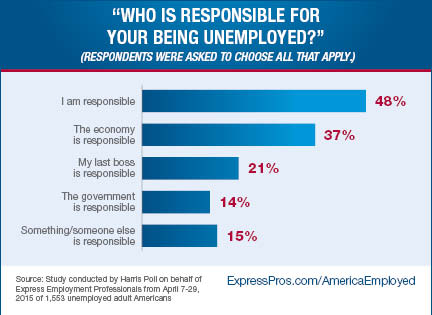
SOME SEARCH HARDER THAN OTHERS
Not everyone is regularly looking for work:
- 19 percent report they spent no time looking for work in the previous week.
- 24 percent spent one to five hours.
- 18 percent spent six to 10.
- 20 percent spent 11-20.
- 9 percent spent 21-30.
- 10 percent spent over 31 hours looking.
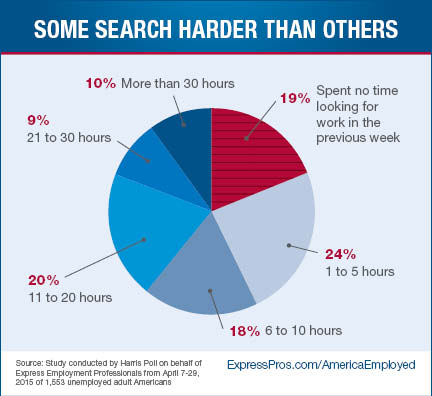
Forty-eight percent also report not having a single interview in the last month - among them, eighty-two percent have not had a single interview since the beginning of 2014 or earlier with 77 percent not having been on an interview since 2013.
Almost half of unemployed Americans are ready to take any job with forty-eight percent agreeing with the statement, "I am willing to take whatever job I can get." While another 32 percent say they are concerned about future stability, agreeing with the statement, "I am looking for a job with a company that has a history of stability to reduce my risk of losing a job even if it means a lower salary or wage." Finally, 20 percent are not ready to settle. They want to see an improvement over their last job, agreeing with the statement, "I am looking for a job that meets or exceeds my previous salary/wage and I would be unwilling to accept a job making less money."
MOST WOULD LOOK HARDER WITHOUT JOBLESS BENEFITS
Among the unemployed, 14 percent are receiving unemployment benefits.
Of those receiving benefits, 89 percent say they would "search harder and wider" for work if their benefits ran out before finding a job.
Those receiving benefits were asked whether they agree with a series of statements about unemployment compensation benefits.
- 40 percent agree that "I haven't had to look for work as hard knowing I have some income to rely on."
- 36 percent agree that it "has allowed me to turn down positions that weren't right for me."
- 69 percent agree that it "is giving me a cushion so that I can take my time in searching for a job."
- 59 percent agree that it "has allowed me to take time for myself."
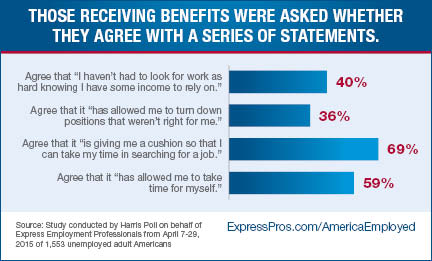
Among those who are not receiving unemployment benefits, 37 percent never applied. Another 32 percent say they are not eligible. For 22 percent, benefits have already run out, and nine percent were denied.
"Over the last year, we have seen the unemployment rate go down, but we too easily forget that there are people still hurting, still wanting to work, but on the verge of giving up. I believe everyone who wants to work should have a job, so we must not overlook those who have been left behind and left out of the job market," Funk said.
Survey Methodology
This study was conducted online by Harris Poll on behalf of Express Employment Professionals and included 1,553 U.S. adults aged 18 or older who are unemployed but capable of working (whether or not they receive unemployment compensation benefits). Excluded are those who are currently retired, choose to stay at home, or are unable to work due to long-term disability. The survey was conducted between April 7 and April 29, 2015.
Results were weighted as needed for age by gender, education, race/ethnicity, region and household income. Propensity score weighting was also used to adjust for respondents' propensity to be online. Totals may not equal the sum of their individual components due to rounding. No estimates of theoretical sampling error can be calculated; a full methodology is available.
###
If you would like to arrange for an interview with Bob Funk to discuss this topic, please contact Sherry Kast at (405) 717-5966.
About Robert A. Funk
Robert A. "Bob" Funk is chairman and chief executive officer of Express Employment Professionals. Headquartered in Oklahoma City, the international staffing company has franchises in the U.S., Canada and South Africa. Under his leadership, Express has put more than five million people to work worldwide. Funk served as the Chairman of the Federal Reserve Bank of Kansas City and was also the Chairman of the Conference of Chairmen of the Federal Reserve.
About Express Employment Professionals
Express Employment Professionals puts people to work. It generated $2.85 billion in sales and employed more than 456,000 people in 2014. Express ranks as the largest franchised staffing company and second largest privately held staffing company in the United States. Its long-term goal is to put a million people to work annually.